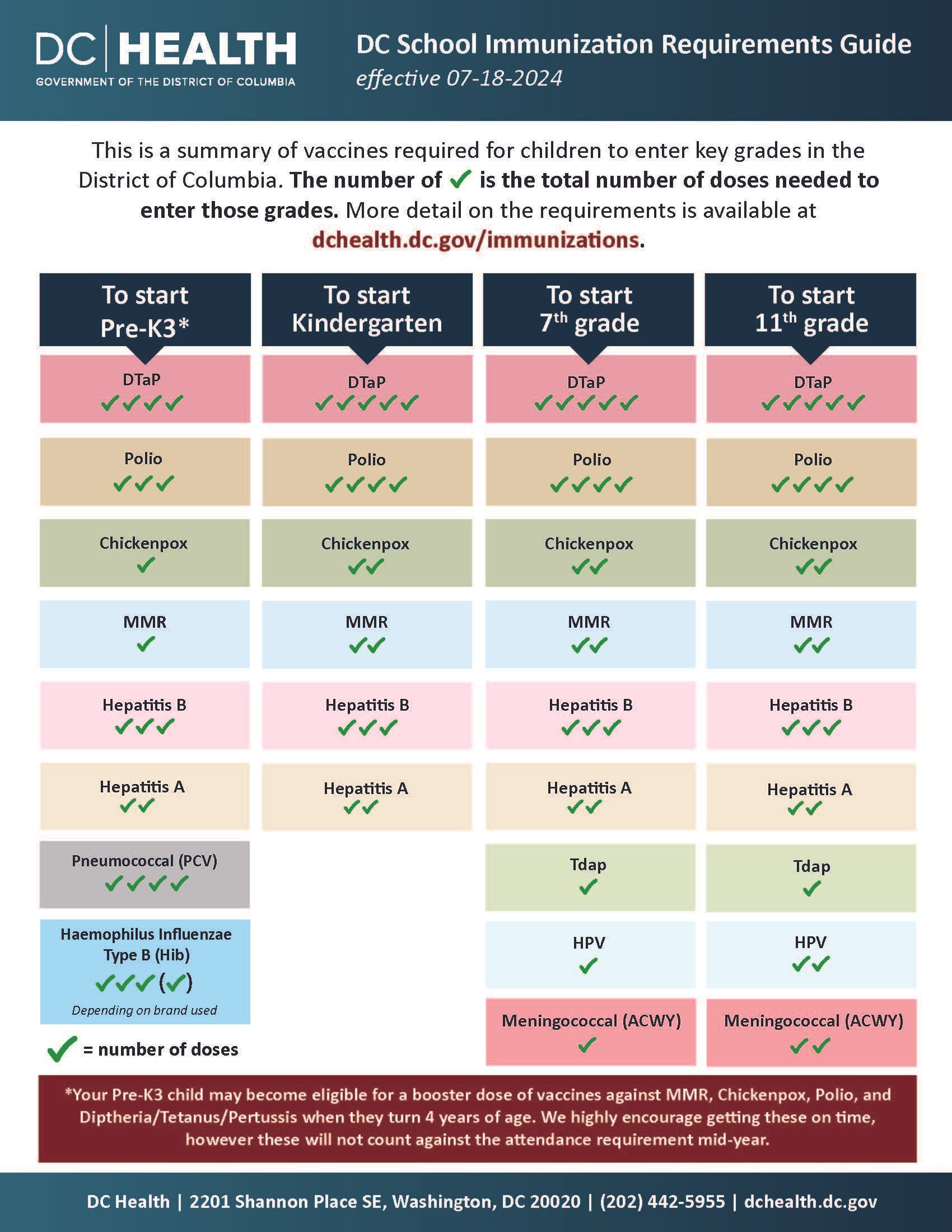The Health Office is open Monday through Friday from 8:15 a.m. to 3:30 p.m. during the school year. The school nurse, Mrs. Ester Ackerman, BSN, RN can be reached at 202-544-1618 x150.
For your child’s safety, we request complete health information on the Student Health/Emergency Card in TADS, including any conditions and medications. As changes occur during the school year, please notify the school nurse. This information is confidential and may only be shared with other school personnel if relevant to safety or education.
All students must be completely immunized in accordance with the immunization requirements set by the District of Columbia Department of Health and the Archdiocese of Washington in order to attend school in DC.
-
Student Absence or Tardy Protocol
On days when students are absent or significantly tardy, parents MUST call the school office (202-544-1618) no later than 8:45 a.m. on the day of the occurrence. They are to give the student’s name, grade, and reason for the absence or tardy. If the office does not hear from the parent, a call will be made to ascertain where the child is. When an email is sent to the student’s teacher regarding an absence, tardy or early dismissal, please include attendance@stpeterschooldc.org to notify the school nurse, principal, and front office staff. A student must present a written note of explanation, signed by the parent, upon returning to school after an absence. For all health appointments, a note from a licensed healthcare provider’s office must be submitted for an excused tardy, early dismissal or absence. A student is considered absent if not present for four (4) hours of the day. This also includes half days.
-
Student Illness Protocol
If a student becomes ill during the night or in the morning before coming to school, parents are to keep their child at home. The parent must contact the school to inform the necessary personnel of their child's absence. Our faculty and staff will also observe each student daily for symptoms of illness and possible contagious diseases or conditions.
The student will be excluded temporarily from school until cleared by a healthcare provider, if required, and symptoms have resolved. This includes, but is not limited to, the list below:
- Contagious illness symptoms such as fever (100.4 degrees Fahrenheit or greater), repeated vomiting or diarrhea, worsening or severe sore throat.
- Persistent or sustained coughing, shortness of breath or difficulty breathing.
- Any new onset of rash accompanied by fever (100.4 degrees Fahrenheit or greater).
- Redness, swelling of the conjunctiva, irritation and/or discharge from one or both eyes.
- Skin lesions with drainage that cannot be covered or contained by a waterproof bandage.
The student will remain at home for at least 24 hours and until symptoms resolve and must be fever-free without fever/pain reducing medication (acetaminophen, ibuprofen) for 24 hours before returning to school.
Please refer to the Parent-Student Handbook for additional information.
-
Student Medication
Students may not have possession of any type of medication, prescription or over-the-counter (OTC). Only students requiring emergency medications (e.g., epinephrine, inhaler, or insulin) will be allowed to self-carry if a written order has been issued by the licensed healthcare provider (LHCP). St. Peter School assumes no responsibility for any medication administered by the student to him/herself.
Please refer to the Student Medication Policy in the Parent-Student Handbook for complete details.
-
Food Allergies
Numerous St. Peter School students have allergies to certain foods, particularly peanuts and tree nuts. For these students, an allergic reaction can be serious and sometimes life-threatening. Please keep this in mind as you prepare your child's snack and lunch and avoid sending in food or other products containing peanuts, peanut butter, or nuts/tree nuts. Tree nuts include, but are not limited to, walnut, almond, hazelnut, cashew, pistachio, and Brazil nuts. These are not to be confused or grouped together with peanut, which is a legume, or seeds such as sunflower or sesame (FARE – Food Allergy Research & Education). When shopping for food, read the ingredients label to ensure the item does not contain peanuts or tree nuts. Students must not share or trade food.
-
Health Forms
-
Head Lice Policy
The Centers for Disease Control and Prevention, the American Academy of Pediatrics, DC Health, and the National Association of School Nurses support the following procedures for schools; click here for the full SPS Head Lice Policy:
- Identify if head lice are present when a student complains of an itchy scalp, particularly behind the ears and at the back of the neck.
- If any live head lice are found, a parent or guardian will be informed and may pick up the student to begin treatment.
- A student may remain in school until the end of the day with live head lice if he/she can refrain from direct head contact with other persons. Prompt and proper treatment should then be given at home.
- If only nits are found, a parent or guardian will be informed to pick up the student at the end of the day, inspect for head lice and begin nit removal of those found within ¼ inch of the scalp and/or begin head lice treatment. The parent is to continue monitoring for re-infestation for 10 – 14 days.
- Parents and guardians will be asked to inspect all members of their household, to carefully follow the directions of the chosen treatment, and to monitor the effectiveness of the chosen treatment for 10 – 14 days.
- Students can return to school the next day if the parent confirms that proper treatment has begun.
- Regular inspections will be made at the beginning of the next school day to detect if treatment was effective.
- If two or more students from that class are found with active head lice, the school administration will instruct class parents to conduct a head screening of their child at home and on a regular basis.
Parents who suspect the presence of head lice on their child(ren) should inform others who may have been in close contact with their child(ren) and inform the school nurse so that the school can be on alert of others who may demonstrate symptoms of head lice.
-
School Health Legislation
Under the Healthy Schools Act of 2010, DC law requires all students attending Pre-Kindergarten through Grade 12 in public, public charter, private or parochial schools in the District of Columbia to have an annual physical and to submit a DC Universal Health Certificate, completed and signed by a physician or advanced practice nurse, to the school. The health certificate is valid for 365 days.
Therefore, complete physicals with up-to-date immunization records are required every school year for every grade. Your child's physical exam can be scheduled at any time during the year, particularly near his/her birth date, but must be performed each year within 365 days of the previous exam. If your child is required to have specific immunizations for a particular age group or grade, we must have documentation that he/she has received the vaccine(s) by the first day of school or on file in TADS. If your child is not compliant with required immunizations by the 20th school day, he/she will not be allowed to attend in-person classes.
Dental exams are recommended every six months or annually for all grades. The DC Oral Health Assessment Form must be submitted once per school year.
Health Blog



St. Peter School, Capitol Hill
422 Third Street SE
Washington, DC 20003
Phone:
(202) 544-1618
Fax: (202) 547-5101


